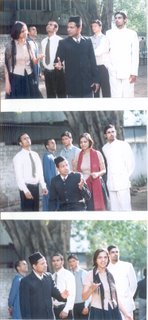
Kirti Jain / New Delhi July 02, 2005 / Business Standard
Are we living in a police state? Is all this talk about the largest democracy a sham? It would seem so from what one heard about a play performance being deferred...because the police did not permit the group to perform!
The play in question is Asmita’s Mr Jinnah, written by Narendra Mohan and directed by Arvind Gaur. It had been in rehearsal for a month before L K Advani got involved in the Jinnah controversy, and had obviously been written some months before that.
In the morning preceding the performance, the police informed the group that they were not granting permission to stage the play, at least not then as they had not read the play.
Why the police would want to read the play instead of looking after traffic, or enforcing law and order, is beyond comprehension.
There is every reason to believe, for arguments sake, that if the play had been called Mr Sharma (for instance), it would not have suffered this high handedness on the part of the police.
This raises many questions. By what law, or rule, does the police get the right to grant (or not grant) permission to perform a play? If there is such a rule, is it desirable?
How is the police qualified to judge the merits and demerits of a piece of art? If not them, then is there a committee of qualified experts to do this? Does anyone know how this committee is constituted? And then, of course, there is the larger question of censorship of art and its validity that is constantly under debate.
I can only attempt to answer one of these questions. In 1876, the British government, when it was uncomfortable with political plays that attacked it, and which were drawing popular acclaim from the audience, had promulgated a law that was called the Dramatic Performances Control Act.
As a result of this act and its draconian powers over the performing arts, the Indian audiences were completely deprived of any political or protest plays for almost a hundred years till the middle of the twentieth century. In effect , the law changed the shape of the Indian theatre during those years when theatre was really at its peak.
The British left but, unfortunately, this repressive act stayed on. For the last 60 years , several theatre people have approached the authorities to revoke the act.
They have also been given assurances that this would be done. But the law stays on. By and large it remains dormant but it is there to be imposed whenever the authorities feel shaky or in disagreement about the contents (and even, as in this case, the title of a play).
It is ironic that this law is used against theatre which is otherwise considered insignificant by most sections of our society, not least of all by the government.
So, any performance can be stopped at any time, as has been done in this case. So an amateur group, which is in any case cash-strapped, will now suffer further financial loss?
Who will compensate for this loss, apart from the loss of time and energy of a large group of artists, who have probably worked on the play for two months?
And why in independent India should any group wanting to perform, even non-commercially, have to run to four different departments of the police for permissions, before every performance? When, invariably, the authorities will keep you on tenterhooks till, quite literally, the very last moment.
It is a surprise that Delhi theatre practitioners still carry on doggedly in spite of these disincentives.
It must be their commitment that drives them — a commitment to create meaningful art; a commitment to share new insights with their audience; a commitment to bring to light what they perceive is wrong in society; and a commitment to entertain. Surely these people deserve better!
No comments:
Post a Comment